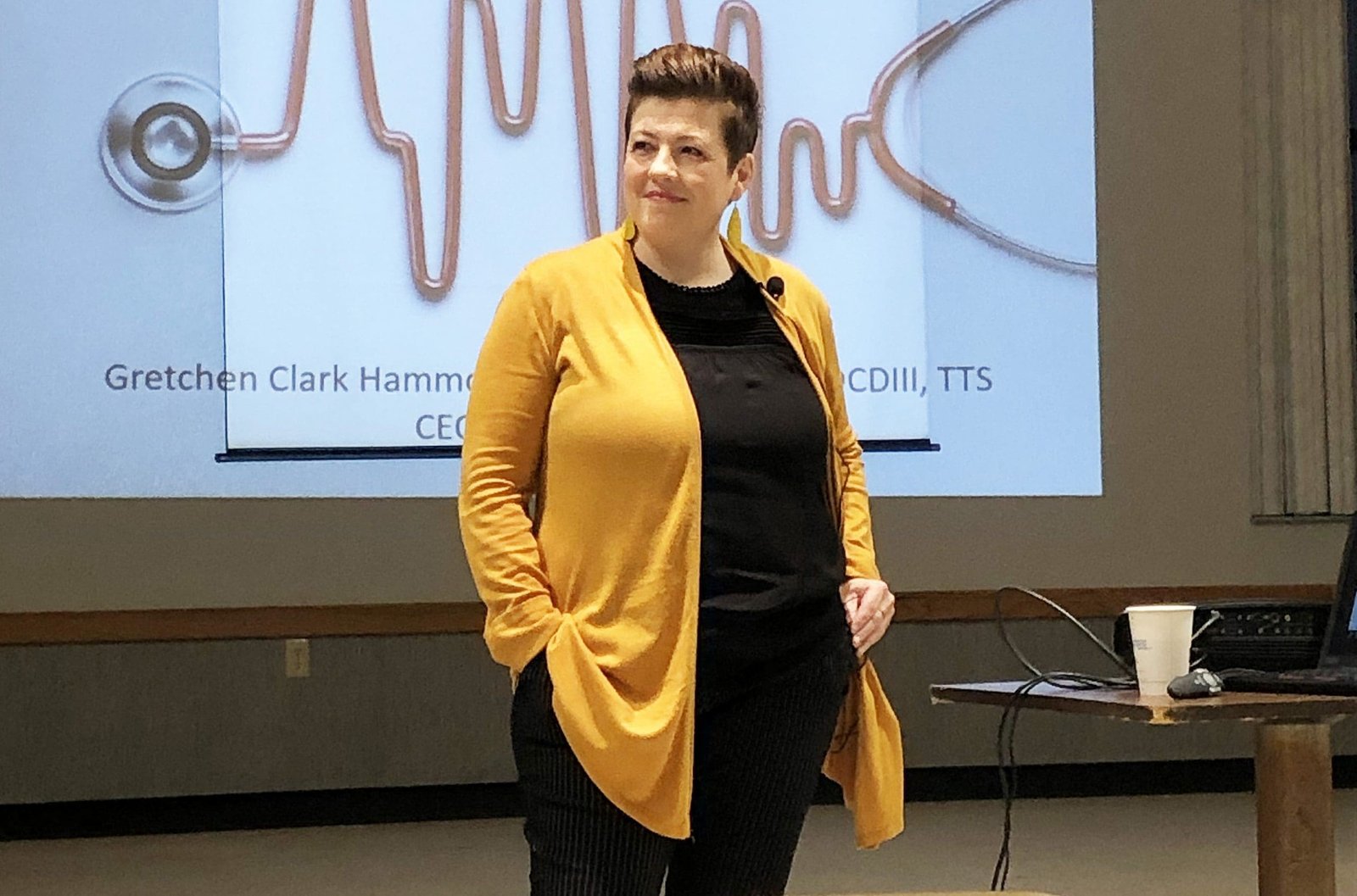
DR. GRETCHEN HAMMOND … A large group of health care and other caring professionals from around the state gathered on Thursday morning, January 19, 2023 to hear wise counsel from this social worker who not only has the knowledge but the experience to teach about trauma, addiction and mental health. (PHOTO BY REBECCA MILLER, STAFF)
By: Rebecca Miller
Thursday morning, January 19, 2023, dawned bright and early for health professionals in Williams County as around fifty individuals gathered at Bryan Eagles for breakfast and some extremely helpful training.
The trainer, Dr. Gretchen Hammond, a Social Worker and CEO of Mighty Crow, was a powerful speaker who held her audience’s attention for the entire morning with humor, honesty and a loaded power point presentation.
The information was the kind that can be life changing if put into practice, not only as a health professional dealing with clients, but as a human being in relationship with others.
“Be an advocate of Wellness in our Community!” “Grow the Recovery Support System in your area.”
“Build your own and help others build coping skills.”
“Maybe we are not even in the same storm.” “Don’t ask ‘what’s wrong’, ask ‘what happened’” “We all have a trauma journey.” “Grow your empathy muscle.” “We ARE stronger together.”
Williams County helping professionals were joined by others from all over the state with the sign in list showing representatives from around thirty different entities.
Williams County Health Department, Arrowhead Behavioral Health, Defiance County General health District, Sarah’s Friends, Williams County Adult Probation, Parkview, Williams County EMS, Northwest Ohio Juvenile Delinquent Center, The Center for Child and Family Advocacy, Williams County Family and Children First Council, Ohio State Wexner Medical Center, Maumee Valley Guidance Center, Shalom Counseling and Mediation Center, The Ohio State University, Williams County Public Library, The Ability Center, United Way, Healing Communities Study – UC, New Home Development, and Never Let Go Ministries were just some of those represented.
The morning, which ran from 7:30 – 10:30, and was entitled “Breaking the Stigma: Mental Health, Addiction and Trauma” was broken into two sessions, the first titled “The Trauma of Being a Helping Professional” and the second being “Breaking the Stigma: Addiction and Mental Health.”
Williams County Health Commissioner James Watkins welcomed everyone and introduced Dr. Hammond, also stating that at the end there would be a short presentation on grief recovery shared by WCHD’s Brittany Spotts.
The purpose of the seminar was for participants “to understand trauma and traumatic experiences and the signs of chronic stress”, and “to understand compassion fatigue and how to utilize wellness strategies to address it.”
Some of the highlights from Dr. Hammond’s presentation, which can be helpful for parents, teachers, co-workers in any setting, and just about anyone besides the helping professionals who were blessed to hear it, included:
-Trauma fatigue, or burnout is real! It is a threat to the workforce.
-It is preventable if you are aware of it.
-Effects of chronic fatigue are exhausting, but there are strategies to survive and thrive while serving others
-Having a stigma attached to mental health caused by a traumatic event or life situation, makes it even worse, as people minimize it.
-Maybe we are not even in the same storm, let alone the same boat! Every traumatic event is unique and every person dealing with one is unique, so even though there are basic types of Trauma, they are all approached differently.
-The importance of Compassion and how to keep from drowning in the hurts of others.
Probably one of the most powerful slides in her power point had “Symptoms of Compassion Fatigue” in the center and all around it they were listed: anxiety, sleep disturbance, hypervigilance, pervasive hopelessness, self-doubt, inability to concentrate, disorientation or forgetfulness, withdrawn/isolation, apathy, anger, emotional rollercoaster, decreased sexual intimacy, feeling overwhelmed, poor selfcare, appetite changes, minimization, and loss of purpose.
Hammond pointed out that during the first year of the COVID pandemic, it seemed like a tidal wave of this occurred amongst the health professionals and many of them stepped out of the jobs they had loved before, unable to deal with all that was happening.
Others made it through, with the knowledge that others saw them as heroes, only to be hit by the horror of being seen as the bad guys!
Needless to say, it has been a very rough time over the past few years and she is hopeful that knowledge will bring assistance to anyone struggling with compassion fatigue.
A quote from Audre Lorde which she shared said, “I have come to believe that caring for myself is not self-indulgent. Caring for myself is an act of survival.”
Hammond also addressed Dimensions of Wellness, how to cultivate healing, and the importance of community.
She shared how to walk in empathy and not just sympathy, showing an excellent little video from YouTube and giving four qualities of Empathy:
- Perspective-taking – recognizing a person’s perspective as Their Truth
- Staying out of judgement
- Recognizing emotion in other people
- Communicating emotion to other people (The video Short can be seen at youtube.com/watch?v+1Evwgu369Jw)
Following a short break, Dr. Hammond returned for the second portion of the morning.
It was a little shorter and contained some further discussion of trauma. She addressed what she called two chronic diseases – Mental Health and Addiction.
A thought greatly worthy of mention was that “Addiction hijacks the brain!” But, she said, “It Is Preventable and It is Healable.”
The purpose of this portion was “to learn about the role of trauma and social determinants of health in the development of substance use disorders and mental health disorders,” and “Learn about the core features of recovery, stages of recover and a Recovery Oriented System of Care (ROSC).”
Trauma impacts behavioral health, as the person is under so much. It can be the root cause and often is there at the bottom of it all. Doing unsafe things comes with being addicted to something.
She stressed how important it is to work hard for prevention of Addiction during childhood, as ACEs or Adverse Childhood Experiences have been proven to be connected to health and well-being in later life.
From the study that showed this, it also showed that substance abuse seems to be the one most needed to be prevented.
“Anything you can do in your community to address and de-stigmatize substance abuse will pay off in dividends for generations to come,” she declared.
Ways to prevent ACEs as a Community include: “strengthen families’ financial stability, promote social norms that protect against violence, help kids have a good start, teach health relationship skills, connect youth to caring adults and activities, and intervene to lessen immediate and long term harms.”
A huge part of dealing with mental health, addiction and trauma in our communities is Focus on Recovery!
Hammond shared her favorite definition of Recovery, “A process of change through which individuals improve their health and wellness, live a self-directed life and strive to reach their full potential.”
If people who are in recovery can learn and embrace the skills for health, home, community and purpose, they will be able to plug back into society as a healthy individual. She pointed out that Recovery Housing in Ohio is essential.
The absolute necessity for everyone, including the helping professionals, to realize that communities need to focus on recovery, showed in all of her power points…10 Guiding Principles of Recovery; stages of recovery; early recovery, the length of time it takes for true recovery; the fact that those in recovery for a long time can suddenly feel like they are going to fall back into addiction; the thought that it is so long that there are beginning, middle and long term recovery; Prevention is Most Important but if it happens then Recovery becomes the most important for that person; sustained recovery; and the need for recovery support services.
Dr. Hammond ended the second seminar with the Key Points of Recovery:
-Recovery from substance use is life long, just as other chronic diseases
-It thrives from support, hope, and environments that nurture it
-Recovery evolves over time as individuals change and grow.
As social workers and other helping professionals, we can advocate for recovery supports and environments that support recovery.
Certified Grief Recovery Method Specialist Brittany Spotts, who is part of the Williams County Health Department offers grief support groups.
The morning ended with Spotts sharing for a few moments, stating that she is happy that this is now available in the area.
She shared definitions of grief, the need to be taught how to deal with losses that bring grief, what things can cause grief, and that there is hope for those who are struggling with grief.
Anyone in Williams County who is struggling with grief over any changes in your life and would like to have some assistance should call Brittany at WCHD at 419-485-3141 or email her at brittanyspotts@williamscountyhealth.org.
Rebecca may be reached at rebecca@thevillagereporter.com


